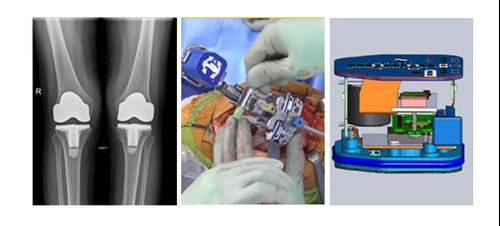Dear Guest,
We would be delighted to receive your feedback on our services.
Captcha * (case sensitive)
Technology has impacted all the facets of our civilization and today many of the gadgets have become an inseparable parts of our lives. Modern medicine has thrived on innovation and the numerous strides that have transformed the lives of millions was a result of thoughtful thinking and integration of technology with medicine. We at Sir HN RFH firmly believe in bringing the best of technology and human expertise to ensure the best outcomes for our patients.
We report here an interesting case that was performed by our team of joint replacement surgeons and involved a perfect duet and successful integration of the technology with medicine. One of the most important aspects of performing a knee replacement is ensuring the accuracy and improving alignment of the implanted prosthesis. Conventionally, this is done manually and the surgeons experience and intraoperative judgment plays a crucial role. This was improvised using computer navigation that used large radar like instruments that tracked the track balls inserted in the bone.
In the current case, we at HNRF used a pin-less personalized navigation system that involved small disposable pods and an I Pad like system controller. The technology is in many ways similar to ones used by Fighter jets and consists of accelerometers and gyroscopes – devices now found in many new generation smart phones.
Accelerometers measure how fast the speed of things change, and gyroscopes are used for measuring and maintaining orientation based on the principle of angular momentum. Together the use of these devices offer live intraoperative feedback and help achieve improved implant placement accuracy and alignment. It is noted that better accuracy achieved by the navigation in knee replacement may result in faster rehabilitation and shorter stay.
In this particular case Mrs. AP 62 year old clerk in the BMC had severe osteoarthritis of the knee that prevented her from walking long distance and indulge in even simple activity such as going to the temple or playing with her grand kids. After her routine pre anesthesia check-up and evaluation, she underwent bilateral (both) knee replacement using the pin-less navigation technology. Being the first simultaneous bilateral case using the technology in the city of Mumbai – a pre surgery team huddle and discussion was carried out.
Since the precision and time management was a key, the entire team rehearsed all the surgical steps to ensure a clockwork precision of the surgery. The anesthesia team headed by Dr. Hemant Mehta and the surgical team headed by Dr. Vaibhav Bagaria proceeded with the procedure and with support of the entire OR team ensured that procedure went as per the plans. Using this technology ensured a near perfect natural alignment and patient was made to walk the very next day. She started climbing stairs and was fit for discharge by the third day.
The X rays done after the surgery revealed an excellent alignment and now after her suture removals and physiotherapy, she is back to enjoying what she loved most – taking a walk to the nearby temple and playing with her favorite grandson!

Figures:



RELIANCE FOUNDATION HOSPITAL Free Mobile App From

